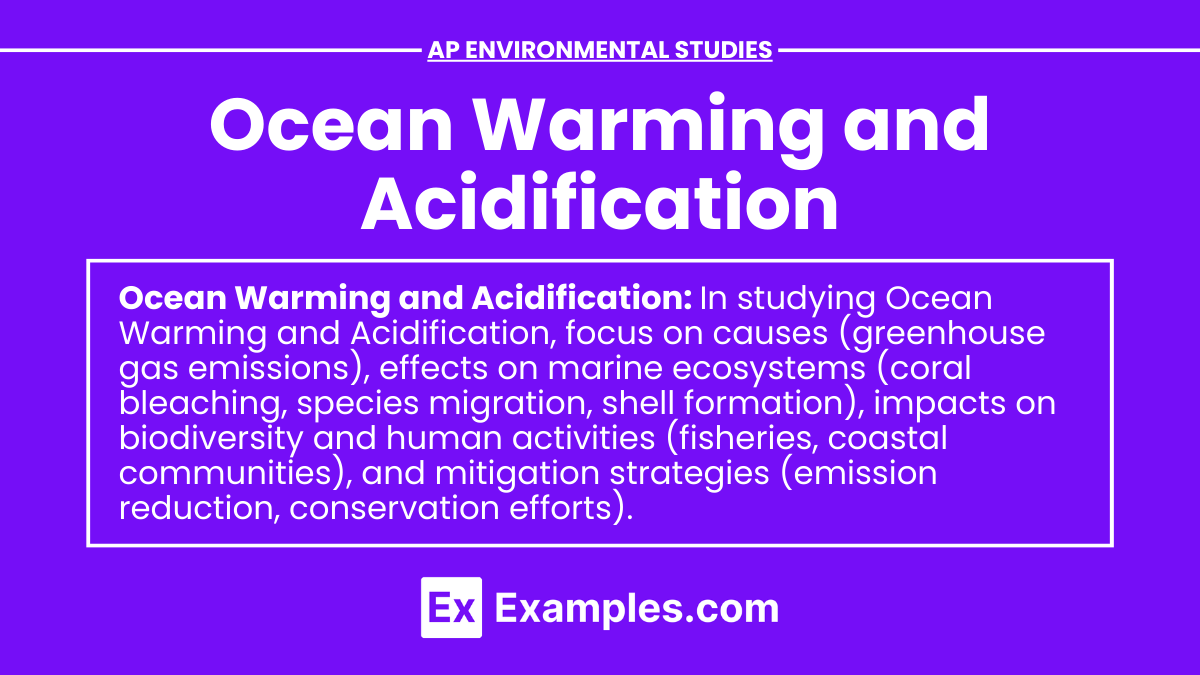In AP Environmental Science, understanding ocean warming and acidification is crucial as they significantly impact ecology, ecosystems, biodiversity, and the biosphere. Increased greenhouse gas emissions cause rising ocean temperatures and increased CO₂ absorption, leading to acidification. These changes disrupt marine ecosystems, threaten biodiversity, and affect the balance of the biosphere. Studying these phenomena helps us grasp their profound implications on global ecology and develop strategies to mitigate their effects.
Free AP Environmental Science Practice Test
Learning Objectives
By studying ocean warming and acidification, students will understand their impacts on organisms, including flora and fauna, and how these processes drive climate changes. They will explore the causes and consequences of rising ocean temperatures and increased CO₂ absorption on marine ecosystems. Students will learn about the effects on calcifying organisms, coral reefs, and the broader implications for marine flora and fauna. This knowledge is essential for developing strategies to mitigate and adapt to these climate changes.
Ocean Warming
Causes of Ocean Warming
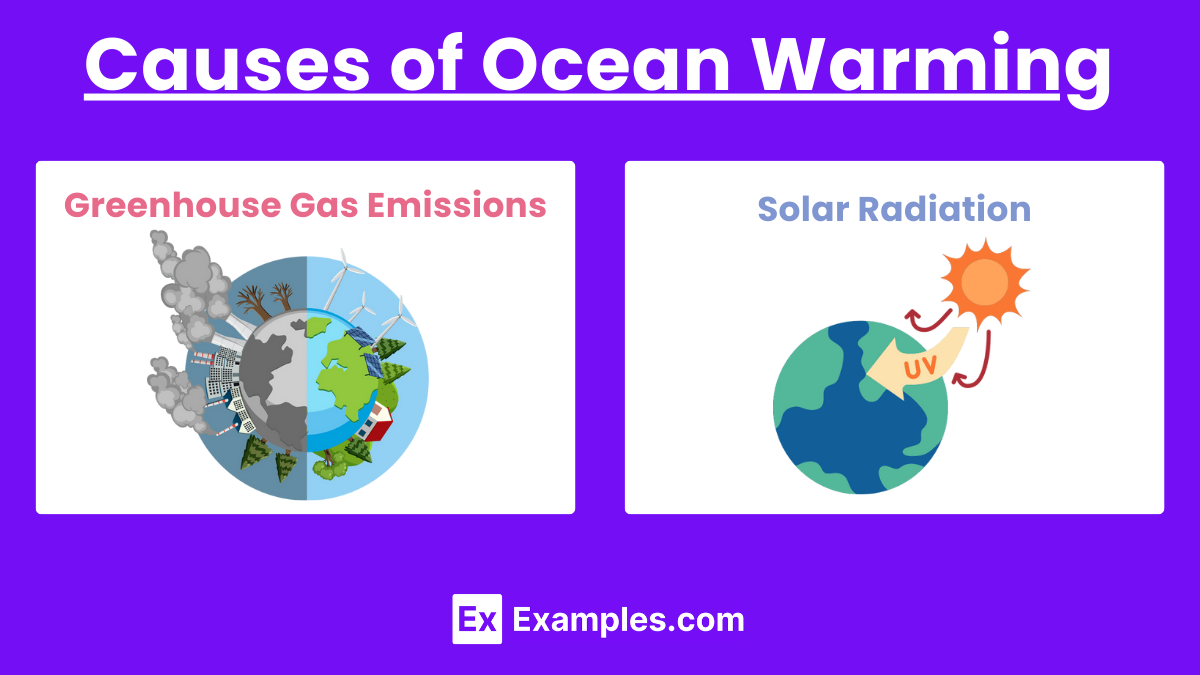
Greenhouse Gas Emissions
Carbon Dioxide (CO₂): Burning fossil fuels increases CO₂ levels, trapping heat in the atmosphere and warming oceans.
Methane (CH₄) and Nitrous Oxide (N₂O): Other greenhouse gases from agriculture and industrial activities also contribute to global warming.
Solar Radiation
Increased Absorption: Higher atmospheric temperatures result in more solar radiation being absorbed by the ocean surface.
Heat Retention: Oceans store a significant portion of the excess heat generated by global warming.
Effects of Ocean Warming
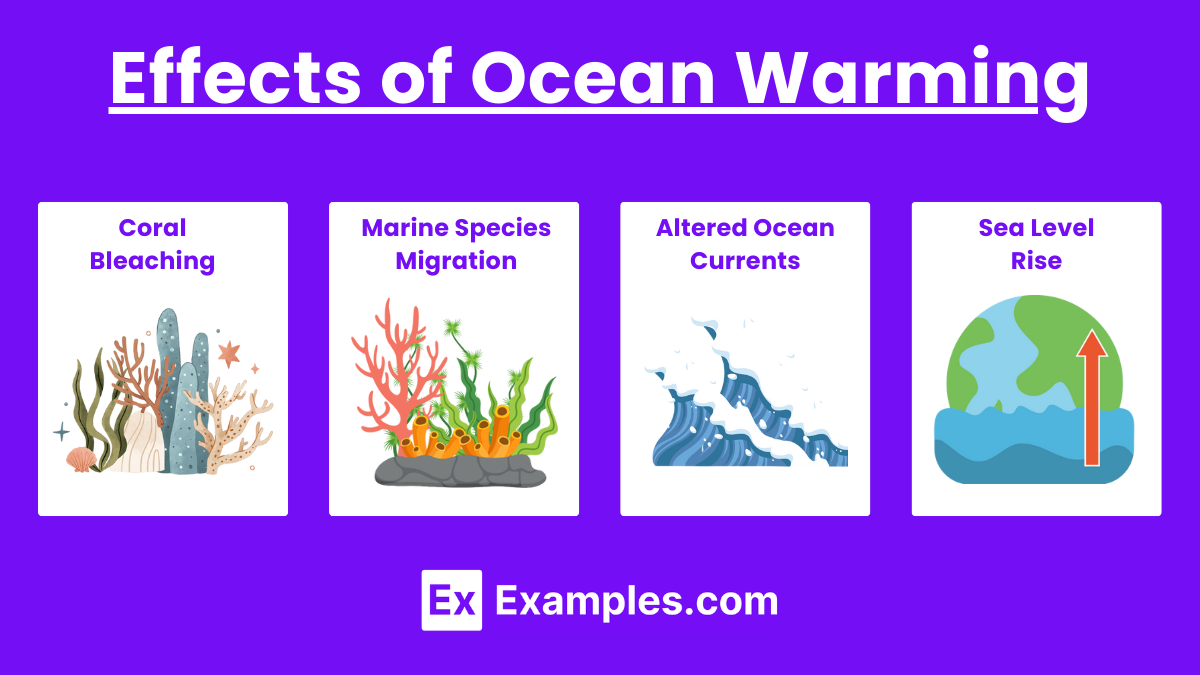
Coral Bleaching
Thermal Stress: Elevated water temperatures cause corals to expel symbiotic algae (zooxanthellae), leading to bleaching.
Coral Mortality: Prolonged bleaching can result in coral death, affecting reef ecosystems.
Marine Species Migration
Range Shifts: Species migrate towards poles or deeper waters to find suitable temperatures, disrupting local ecosystems.
Biodiversity Loss: Species unable to migrate may face extinction.
Altered Ocean Currents
Circulation Changes: Warming affects ocean currents, influencing weather patterns and nutrient distribution.
Impact on Marine Life: Changes in currents can disrupt feeding, breeding, and migration patterns of marine organisms.
Sea Level Rise
Thermal Expansion: Warmer water expands, contributing to rising sea levels.
Ice Melt Contribution: Melting glaciers and ice caps add to the volume of seawater.
Ecological and Economic Impacts
Fisheries: Shifts in fish populations affect commercial and subsistence fishing.
Coastal Ecosystems: Mangroves, marshes, and estuaries are threatened by rising sea levels and temperature changes.
Tourism: Coral reef degradation impacts tourism industries reliant on healthy marine ecosystems.
Ocean Acidification
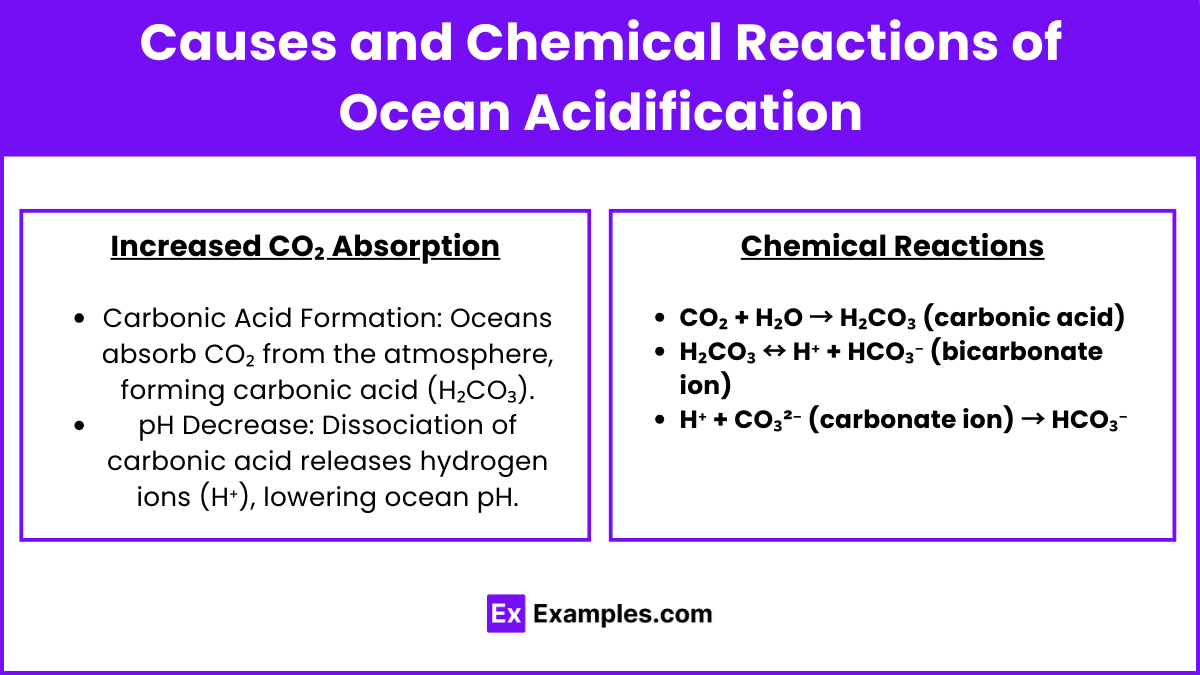
Causes of Ocean Acidification
Increased CO₂ Absorption
Carbonic Acid Formation: Oceans absorb CO₂ from the atmosphere, forming carbonic acid (H₂CO₃).
pH Decrease: Dissociation of carbonic acid releases hydrogen ions (H⁺), lowering ocean pH.
Chemical Reactions
CO₂ + H₂O → H₂CO₃ (carbonic acid)
H₂CO₃ ↔ H⁺ + HCO₃⁻ (bicarbonate ion)
H⁺ + CO₃²⁻ (carbonate ion) → HCO₃⁻
Effects of Ocean Acidification
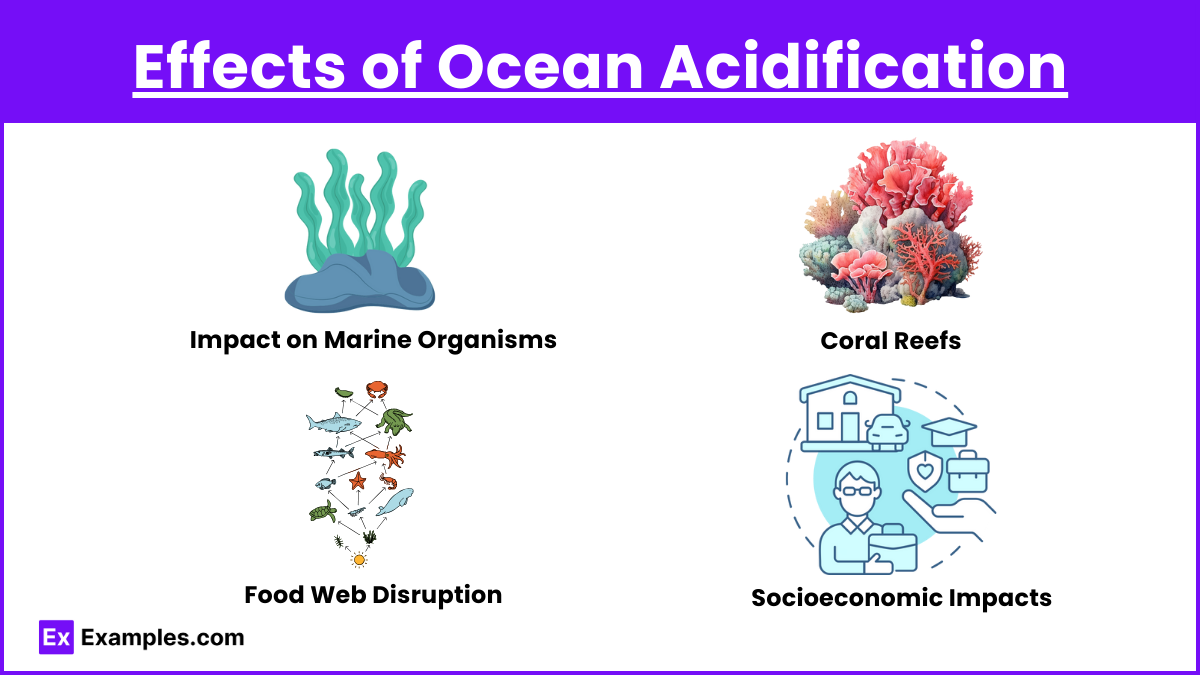
Impact on Marine Organisms
Calcifying Organisms: Species like corals, mollusks, and some plankton rely on carbonate ions to form calcium carbonate (CaCO₃) shells and skeletons. Acidification reduces carbonate ion availability, impairing their ability to build and maintain shells.
Physiological Stress: Acidic conditions affect respiration, reproduction, and growth in various marine species.
Coral Reefs
Reef Degradation: Acidification weakens coral skeletons, making them more susceptible to erosion and damage.
Biodiversity Loss: Coral reefs support diverse marine life; their decline impacts entire ecosystems.
Food Web Disruption
Plankton: Acidification affects plankton populations, disrupting the base of the marine food web.
Fish and Marine Mammals: Changes in plankton availability impact higher trophic levels, including fish and marine mammals.
Socioeconomic Impacts
Fisheries: Reduced populations of shellfish and other marine species affect commercial and subsistence fisheries.
Aquaculture: Acidic conditions can impact the growth and survival of farmed marine species.
Coastal Communities: Economic losses in fisheries and tourism affect livelihoods in coastal regions.
Mitigation and Adaptation Strategies
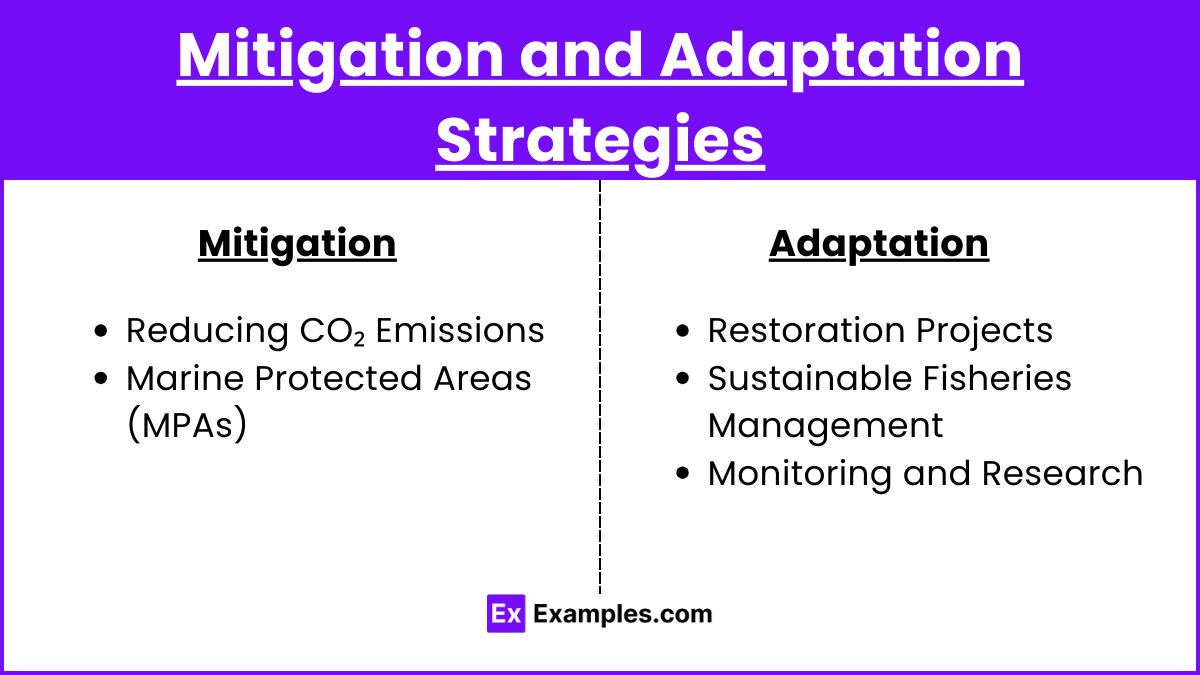
Mitigation
Reducing CO₂ Emissions
Renewable Energy: Transitioning to solar, wind, and other renewable energy sources to reduce fossil fuel use.
Energy Efficiency: Improving energy efficiency in buildings, transportation, and industries.
Carbon Capture and Storage (CCS): Capturing CO₂ emissions from industrial sources and storing them underground.
Marine Protected Areas (MPAs)
Conservation Zones: Establishing MPAs to protect vulnerable marine ecosystems from additional stressors.
Management Plans: Implementing strategies to reduce local pollution and overfishing in protected areas.
Adaptation
Restoration Projects
Coral Reef Restoration: Techniques like coral gardening and artificial reefs to help restore damaged coral ecosystems.
Mangrove and Seagrass Restoration: Replanting and protecting these habitats to enhance coastal resilience.
Sustainable Fisheries Management
Regulations: Implementing fishing quotas, size limits, and seasonal closures to protect fish populations.
Aquaculture Practices: Developing sustainable aquaculture practices that minimize environmental impact.
Monitoring and Research
Ocean Observation: Expanding monitoring programs to track changes in ocean temperature, acidity, and marine biodiversity.
Scientific Research: Supporting research on the impacts of ocean warming and acidification to inform policy and management decisions.

